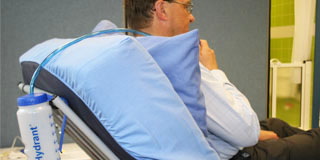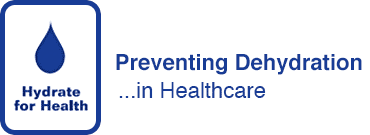Dehydration – the biggest issue in the NHS

“A predictable and avoidable emergency diagnosis that should never occur.”
As the public health environment becomes more challenging with even tighter budget constraints coming into place, Nutrition and Hydration Week 2014 (17-23rd March) is one way of raising awareness and that’s why we are pleased to support the initiative.
According to a leading Government advisor, thirst is needlessly killing 33 patients a day in British hospitals. Add to that the fact that many patients are recovering from surgery that is frequently preceded by several hours of “nil by mouth”; they may have multiple disorders affecting hydration levels; or they may be confused, unwell or physically unable to sit up and help themselves to a drink.
Without water, even a healthy person’s body starts to feel the effects within hours, especially in hot temperatures, which is often the case in hospitals and homes.
Did you know? Acute kidney injury affects one in five people admitted to hospital with five in 100 in-patients developing acute kidney failure that can lead to permanent damage to the kidneys and eventually to death and the disease. This costs the National Health Service and estimated £500 million a year — which is more than lung and skin cancer together!
While hospital food is often in the news, water is a more critical problem, because the effects of dehydration have much quicker manifestations than malnutrition.
So make sure you do your bit to help people you know avoid dehydration by following our our tips:
- The danger signs of dehydration include dry mouth, low blood pressure, dizziness and confusion. If you notice these, bring it to the attention of a nurse or doctor.
- Be aware if your hydration levels – ask the nurse or carer if if he or she can find a moment to explain the hydration measurements that should be on the chart at the end of the bed to help manage this.
- Make sure a drink is always to hand. Be on the look out for empty water jugs or glasses or those that are out of reach. Always offer to pour or help someone to a drink when you are visiting them in hospital, bearing in mind that older and more vulnerable people may not notice that they are thirsty.
- Make sure water is fresh (change at least twice a day) and looks palatable — perhaps by adding a few slices of lemon or orange or ice cubes.
- Make sure your drinking aid is to hand. The Hydrant — our easy-to-use water bottle with a straw that can be hooked onto a hospital bed or chair and will ensure you are getting regular drink.
Nutrition and Hydration Week 2014 (#NHW2013) is a collaboration between the Hospital Caterers Association (HCA), National Association of Care Catering (NACC) and Patient Safety First. (http://nutritionandhydrationweek.co.uk)
For more information follow on @NHWeek and use the hashtag #NHW2014
